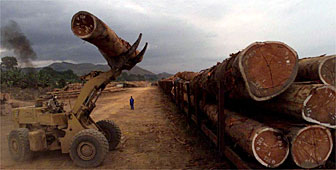
Switzerland defends tropical forests

Switzerland is using its position as chair of the International Tropical Timber Organisation (ITTO) to promote better forest management.
The Swiss have begun to map out an agenda for next month’s council session in Indonesia. The aim is to arrest the destruction of the world’s forests, most of which are still shrinking at unsustainable rates despite several international agreements and conventions to protect them.
“The situation is very serious,” said Manoel Sobral, the ITTO president. “We are losing 15 to 20 million hectares of tropical forest per year. “This situation is worrying because we know these forests contain 50 per cent of the world’s biodiversity.”
For many tropical timber-rich countries, especially in Latin America and Africa, the timber trade forms an important part of their economy. And finding economic solutions to promote the sustainable management of their resources is of key concern to the ITTO.
“To stop these forests from disappearing, we have to make their use more rational if we are to reverse this trend,” Sobral told swissinfo.
Illegal logging
Switzerland intends to use its position of chair to combat the illegal trade and logging of tropical timber, for example. But trying to stamp out such practices is not the only tactic the Swiss intend to use, according to Michel Mordasini of the State Secretariat for Economic Affairs (Seco).
“We want to promote within ITTO a more proactive approach to partnerships with non-governmental organisations and the private sector. Both have an important role to play in certification and fighting illegal trade.”
Switzerland imports around 20,000 cubic metres of tropical wood a year – just 1.2 per cent of the country’s total timber consumption. Nevertheless, Mordasini believes the Swiss have much to contribute to promoting conservation and sustainability of all timber reserves.
“The tropical forest is a cornerstone of our environmental protection and sustainable development policies,” he told swissinfo. “We also feel that Switzerland has a lot of experience in the field of forestry management, as well as orientations to defend and promote.”
Resentment from poor countries
Forestry management is an issue that often fosters resentment among developing nations. These countries see the timber trade first and foremost as an important way of generating hard cash.
Poorer countries need incentives to manage their resources in a responsible way, according to Manoel Sobral, and banning the timber trade is no solution.
“We need to make sure trade is part of the solution,” he said. “Closing markets to them is not going to help.
“We have to invest in good practices of sustainable forestry management. We have to work with local communities, provide training and investment capital, build up institutions.”
The ITTO has several projects in the pipeline with the Swiss, including funding national parks in Indonesia as well as helping indigenous communities, for example in the Amazon, to find alternative ways of generating income.
At the other end of the trade chain, consumers can go some way to encouraging the tropical timber industry to export responsibly. Consumer sensitivity to environmentally sound products is growing in Switzerland, and Seco hopes that the country can be an example in this respect.
by Samantha Tonkin

In compliance with the JTI standards
More: SWI swissinfo.ch certified by the Journalism Trust Initiative





























You can find an overview of ongoing debates with our journalists here . Please join us!
If you want to start a conversation about a topic raised in this article or want to report factual errors, email us at english@swissinfo.ch.